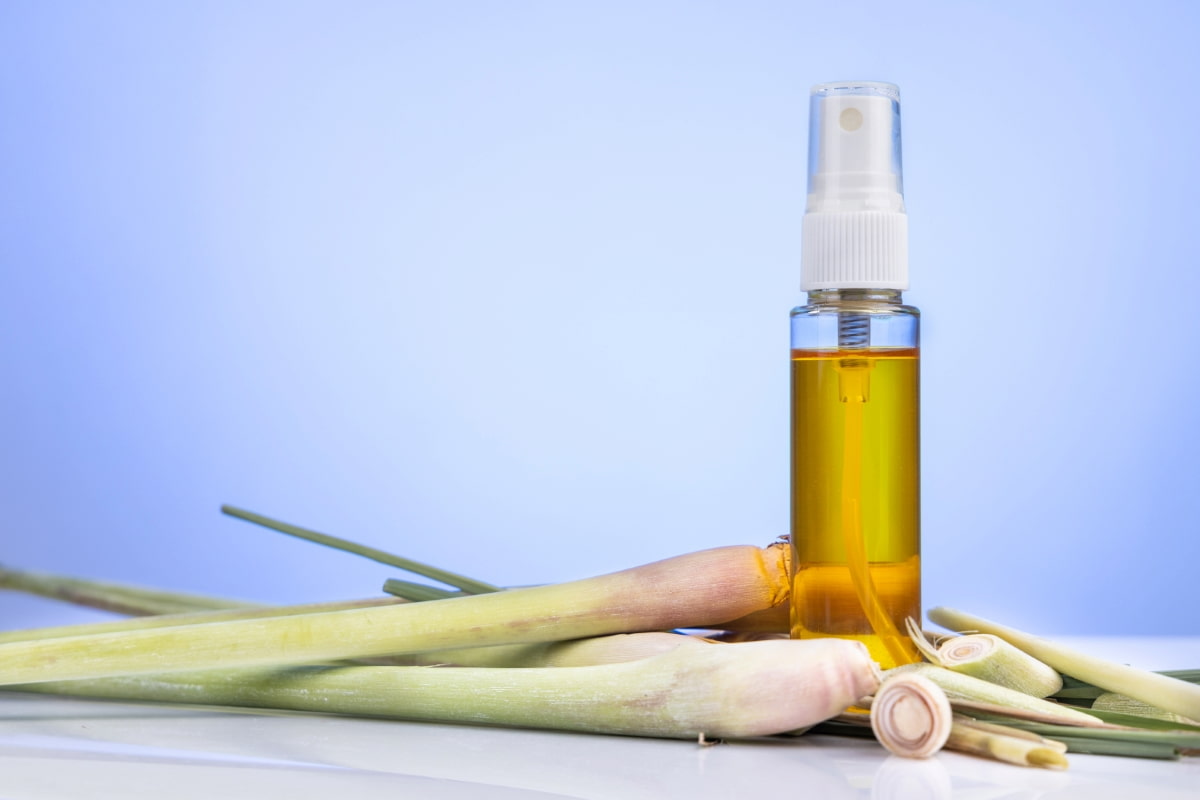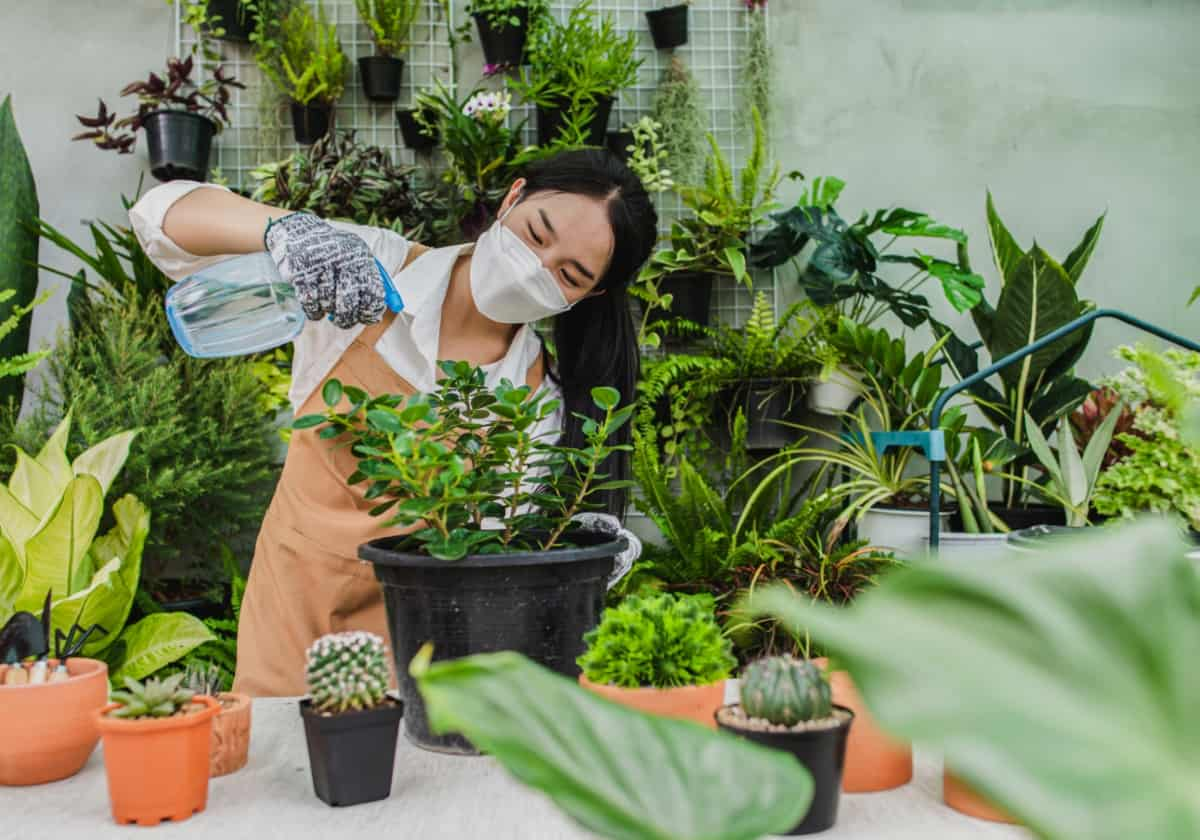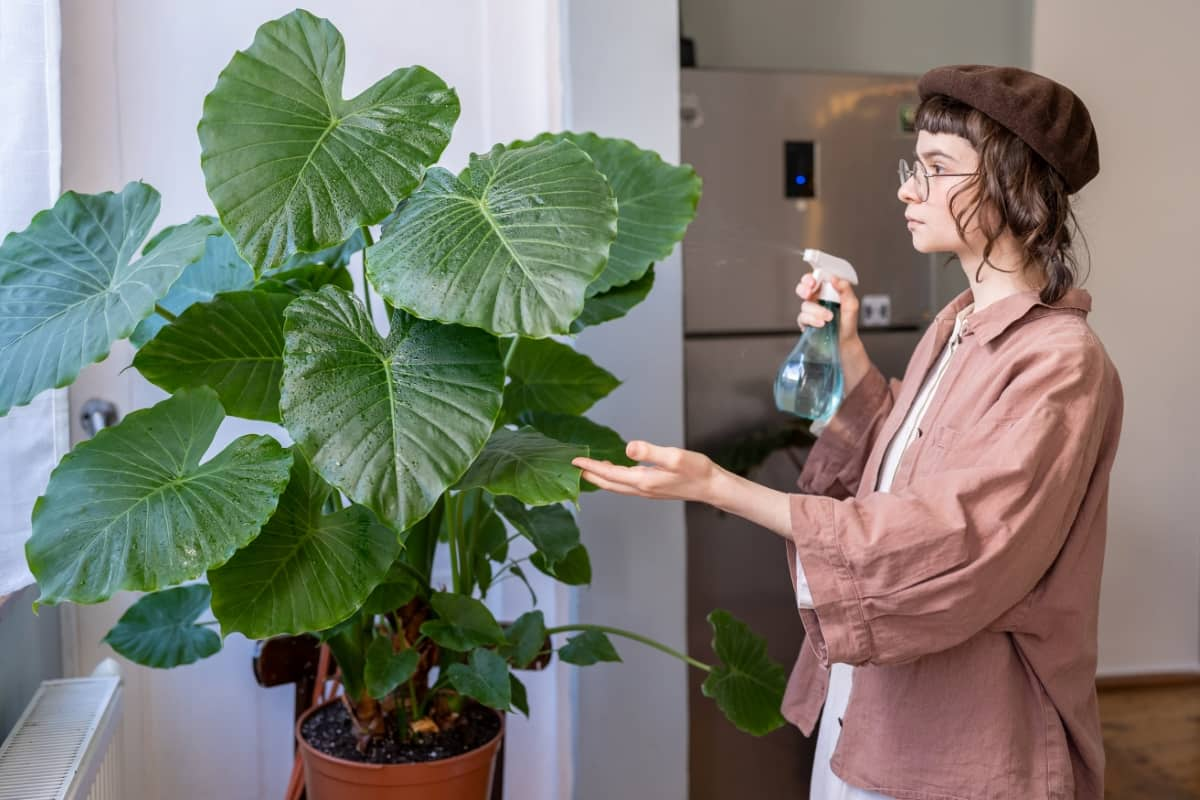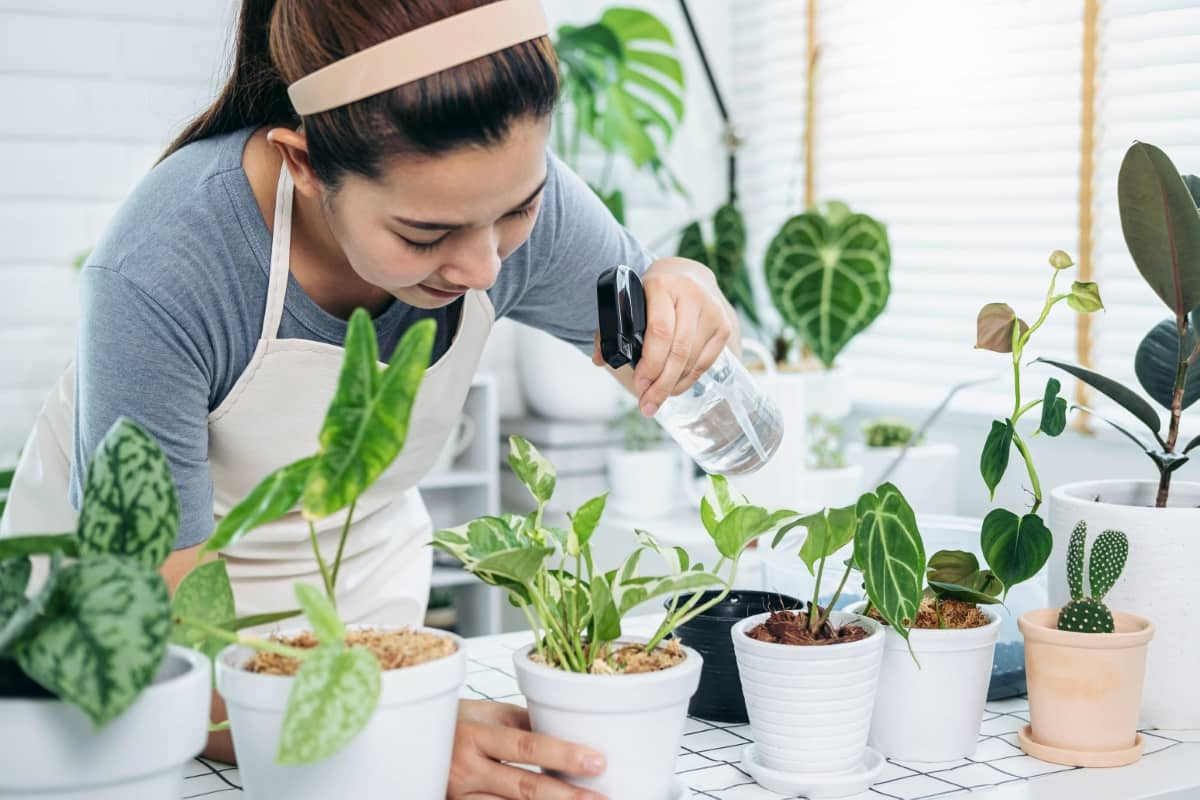Lemongrass oil serves as a potent natural pest control solution for houseplants. Its strong citrus scent repels a variety of common indoor pests like aphids, mosquitoes, and ants without the use of harmful chemicals. This not only keeps your plants pest-free but also adds a refreshing aroma to your indoor space. Regular application is key to maintaining its effectiveness. Embracing lemongrass oil as a natural solution not only safeguards your plants but also promotes a healthier and chemical-free home environment.

DIY Lemongrass Oil Spray for Houseplant Pests
Step-By-Step Guide to Making Lemongrass Oil Spray for Houseplants
- Fill a spray bottle with water, leaving some space at the top for the other ingredients.
- Add 10-15 drops of lemongrass essential oil to the water. Adjust the quantity with respect to the size of your spray bottle.
- For added effectiveness, you can include a few drops of liquid soap (such as Castile soap). This helps the solution adhere better to plant surfaces.
- Close the spray bottle tightly with a cap and shake well to ensure thorough mixing of the water, lemongrass oil, and soap (if added).
- Spray the lemongrass oil solution on the leaves and surrounding soil of your houseplants. Pay special attention to the undersides of leaves, where pests often hide.
- Use the lemongrass oil spray regularly, especially after watering or if you notice any signs of pests. This helps maintain its effectiveness.
How to Mix Lemongrass Oil for Plants
To mix lemongrass oil for plants, add 10-15 drops of lemongrass oil to a small spray bottle. Fill the bottle with water, leaving some space at the top. For enhanced efficacy, consider adding a few drops of liquid soap. Secure the cap and shake the bottle well to ensure thorough blending. Test the mist to confirm a fine spray. Apply the solution to the leaves and soil of your plants, focusing on the undersides where pests may hide. Use regularly, especially after watering or when pest signs appear. This natural mix provides a chemical-free solution for pest control and promotes plant health.
The Benefits of Using Lemongrass Oil as a Natural Bug Repellent for Indoor Plants
Lemongrass oil stands out as a natural bug repellent for indoor plants, offering numerous benefits. Its potent citrus aroma acts as a deterrent for a variety of pests like aphids, mosquitoes, and ants, creating a chemical-free shield around your plants. Unlike synthetic pesticides, lemongrass oil is non-toxic to humans and pets, ensuring a safe indoor environment.
In case you missed it: DIY Eucalyptus Oil Spray for Houseplant Pests: Homemade Natural and Organic Bug Control Recipe for Gardens

The oil’s antimicrobial properties also contribute to the overall health of your plants by preventing the growth of harmful microorganisms in the soil. Additionally, lemongrass oil serves a dual purpose, providing a refreshing and pleasant fragrance within your living space. Incorporating this natural bug repellent not only safeguards your indoor plants but also aligns with eco-friendly and sustainable gardening practices, promoting a healthier, greener home.
Lemongrass Oil Spray Recipes for Different Types of Houseplant Pests
Lemongrass oil spray is an effective natural remedy for various houseplant pests. It repels and controls pests such as aphids, spider mites, whiteflies, and mealybugs. The oil’s strong fragrance disrupts the pests’ feeding and reproductive cycles, discouraging their presence.
Additionally, lemongrass oil possesses antifungal properties that combat mold and mildew. Regular application of a diluted lemongrass oil spray on houseplants acts as a preventative measure against infestations. This eco-friendly solution safeguards your plants and also contributes to a healthier indoor environment by avoiding the use of chemical pesticides.
How to Apply Lemongrass Oil Spray to Protect Your Houseplants from Insects
Test the spray to ensure a fine mist. Apply the solution directly to leaves, targeting both upper and lower surfaces, as well as the surrounding soil. Focus on areas with visible pests. Repeat this process regularly, especially after watering or when pests reappear, to maintain a protective barrier and ensure the health of your houseplants naturally.
Using Lemongrass Oil Insecticide as Safe and Effective Solution for Indoor Gardening
Lemongrass oil insecticide offers a safe and effective solution for indoor gardening. Its natural properties act as a potent deterrent against common pests without harming plants, pets, or humans. To create this safe insecticide, mix 10-15 drops of lemongrass oil with water. Optionally, add a teaspoon of liquid soap for better adherence.
In case you missed it: DIY Essential Oil Spray for Houseplant Pests: Homemade Natural and Organic Bug Control Recipe

Regular application on leaves and soil forms a protective barrier, preventing infestations and promoting plant health. Embracing lemongrass oil as an insecticide aligns with eco-friendly indoor gardening, providing a chemical-free alternative for a thriving and safe indoor garden environment.
Organic Lemongrass Oil Pest Control: DIY Tips for Healthy Houseplants
- Companion Planting: Integrate lemongrass plants among your houseplants. Lemongrass emits oils that act as a natural insect repellent, fostering a protective environment for your plants.
- Lemongrass-Infused Soil: Infuse potting soil with a few drops of lemongrass oil before planting. This helps deter pests and creates a soil environment conducive to plant health.
- Cotton Ball Spot Treatment: Apply lemongrass oil directly to cotton balls and place them strategically around your plants, focusing on areas prone to pest activity.
- Regular Maintenance: Implement a routine maintenance schedule, spraying or applying lemongrass oil solutions regularly, especially after watering, to ensure continuous pest control and promote the overall well-being of your houseplants.
Lemongrass Oil Concentrate: Creating a Potent Bug Repellent for Your Indoor Garden
Crafting a potent bug repellent with lemongrass oil concentrate ensures a thriving indoor garden. Thirty drops of lemongrass oil should be mixed with a tablespoon of neem oil and a cup of water. Blend thoroughly to create a concentrated solution. This potent mix acts as a natural bug deterrent. Dilute a teaspoon of the concentrate with water in a spray bottle and shake well. Then, generously apply to leaves and soil. The combination of lemongrass and neem oil offers a powerful, organic defense against pests, safeguarding your indoor garden while promoting a healthy and vibrant plant environment.
Enhancing the Effectiveness of Lemongrass Oil Spray with Natural Additives for Houseplants
Boost the efficacy of lemongrass oil spray for houseplants by incorporating natural additives. Enhance its pest-repelling power by adding ten drops of peppermint or tea tree oil, known for its insect-deterring properties. A teaspoon of organic liquid soap improves adhesion, ensuring thorough coverage on leaves and soil. For an extra nutrient boost, mix in a tablespoon of neem oil, renowned for its plant-friendly benefits.
This synergistic blend not only fortifies your lemongrass spray’s effectiveness against pests but also provides additional plant nourishment, fostering a holistic approach to maintaining a thriving and pest-resistant indoor garden. The regular application guarantees optimal protection and plant well-being.
Lemongrass Oil Safety Precautions and Best Practices for Indoor Plant Care
- Dilute it adequately to prevent irritation, using 10-15 drops per cup of water.
- Perform a patch test on a small plant section before widespread application.
- Apply sparingly to avoid over-saturation. Ensure proper ventilation during spraying.
- Keep the spray away from the eyes and mouth. Apply in the evening to prevent sunburn on leaves.
- For households with pets, monitor their reactions and consider consulting a vet.
- Store lemongrass oil out of reach of children. With these precautions, lemongrass oil becomes a safe, effective, and plant-friendly solution for pest control in indoor gardening.
In case you missed it: DIY Horticulture Oil Spray for Houseplant Pests: Homemade Natural, Organic Bug Control Recipe

Conclusion
In conclusion, crafting a DIY lemongrass oil spray for houseplant pests offers a natural, organic, and effective bug control solution for gardens. This homemade remedy not only safeguards your plants but also promotes a healthy and eco-friendly gardening environment, steering clear of harmful chemicals and embracing the power of nature.
- Feed Your Flock for Less: Top 10 Tips to Save on Chicken Feed
- Ultimate Guide to Ossabaw Island Hog: Breeding, Raising, Diet, and Care
- Hatching Answers: The Top 10 Reasons Your Chickens Aren’t Laying Eggs
- Eggs and Economics: Breaking Down the Cost of Raising Backyard Chickens
- Defend Your Greens: Proven Methods to Keep Iguanas Out of Your Garden
- Ultimate Guide to Cinnamon Queen Chicken: A Comprehensive Guide for Beginners
- Ultimate Guide to California Tan Chicken: Breeding, Raising, Diet, Egg-Production and Care
- Ultimate Guide to Marsh Daisy Chicken: Breeding, Raising, Diet, and Care
- 10 Types of Chicken Farming Businesses You Can Start for Profits